E-learning company offers course for medicos
MEdRC EduTech, a Hyderabad (India) based e-learning company has signed up a Memorandum of Understanding with Mediciti Institute of Medical Sciences and Hospital in order to provide e-learning solutions for MBBS students who want to be doctors.
MEdRC EduTech is planning to tie up with 20 more colleges, including colleges from Pune to provide these solutions by August 2007. MEdRC EduTech has also designed a solution for the five-year MBBS course on the basis of guidelines of the Medical Council of India (MCI), consisting of 6,000 lectures.
Oracle accelerates for SMBs
 Oracle has launched a portfolio of over 80 industry-specific’ application solutions to address the needs of companies in 30 industry segments including industrial manufacturing, retail, life sciences, engineering, construction, professional services, financial services, government, education and health care.
Oracle has launched a portfolio of over 80 industry-specific’ application solutions to address the needs of companies in 30 industry segments including industrial manufacturing, retail, life sciences, engineering, construction, professional services, financial services, government, education and health care.
The company worked with 50 partners to design, package and price the new products. The move is a part of Oracle’s global Accelerate programme to meet diverse IT requirements of SMBs by combining partner expertise with Oracle’s applications and technology solutions.
India Inc doing its bit of social service
Corporate Social Responsibility (CSR), the commitment of businesses to contribute to sustainable economic development by working with employees, their families, the local community and the society at large has gathered an interesting momentum in last two decades. While the origins of CSR activities can be traced back to the early 1930s, the concept of CSR interventions began to take proper shape only from the 1960s.
A survey on CSR Monitor 2001: Global Public opinion on the changing role of companies, conducted by Environics International, which interviewed around 1,000 people from both developed and developing countries like USA, Canada, Mexico, Britain, France, Germany, Japan, India, Russia and Nigeria, revealed that:
A recent study by Nottingham University Business School, covering seven developing countries in Asia (including India, Indonesia, Malaysia, Philippines, Singapore, South Korea and Thailand) to assess the state of CSR interventions in these countries, revealed that although India is poorer than the other countries covered under the study and had the lowest GNP per capita among the countries, it ranked number one in terms of CSR penetration. About 72% of India’s top 50 companies undertake CSR initiatives supported by well-defined CSR policies. Countries like South Korea (52%), Thailand (42%) and Singapore (38%) were behind India in CSR penetration levels.
Most CSR interventions have been targeted at sectors like health & education, with interventions ranging from adoption of public health facilities by corporates, supplementing existing government programmes like the midday meal programme, assessing & improving learning outcomes in primary education through teacher training, leveraging ICT for improving learning outcomes, etc.
TIS and BT break new ground in child protection training
The global e-learning producer, Tata Interactive Systems, and BT, one of the UK’s largest providers of learning services to government are collaborating to produce a five module programme to enable those working within ‘children’s services’ to understand such concepts as the basics of child protection, how to identify a child at risk and how to develop the skills needed to help each child.
With input from a number of councils, the child protection e-learning modules have been designed by Tata Interactive Systems (TIS) and are delivered by BT’s Flexible Learning service, which provides managed learning services to over 600,000 public sector learners in the UK. The modules comprise of Safeguarding Young People and Children, a ‘basic’ awareness level module, which is intended for all local authority employees.
Mysore gets first IT-finishing School
Mysore will be getting its first IT-Finishing School shortly. New 12-month course by Raman International Institute of Information Technology, PG Diploma in Software Programming, is aimed at producing graduates who are trained up in soft-skills and technical skills.
India produces nearly 4,00,000 engineers every year, but only one in four is employable. Lakhs of graduates come out every year, but only 10% of them are fit to be employed in the IT sector. The trend is that software companies today look for fresh graduates who are trained up in industry culture, and are well-versed with soft-skills and communication skills, along with technical knowledge. The students who want to get trained up in soft-skills and technical skills now have this option, with the new course to be launched by Raman International Institute of Information Technology (www.riit.com).
The course is accredited at the professional level, with the certification from University of Mysore (UOM). Graduate with any degree can apply to the course, and selection will be done through entrance test.
The course is divided into four sections – Foundation track, Tech-track, Project track and Internship track, all with duration of 3 months each. Bank loan facilities are made available by RiiiT to students with financial difficulties. Laptops are provided for every student. The Faculty with corporate exposure helps in shaping the soft-skills of students.
MSC Software Provides Global University Program
 MSC.Software Corp., a leading provider of enterprise simulation solutions to include simulation software and services, has detailed its Global University Programme, a multi-dimensional offering to complement introductions of MSC.Software’s SimEnterprise solutions.
MSC.Software Corp., a leading provider of enterprise simulation solutions to include simulation software and services, has detailed its Global University Programme, a multi-dimensional offering to complement introductions of MSC.Software’s SimEnterprise solutions.
The MSC.Software University Programme provides software bundles as well as curriculum development and teaching assistance and an online community to make principles and theory understandable, enjoyable and relevant for engineering students.
Available as an online resource at http://www.mscsoftware.com/university/ and with online forums at http://forums.mscsoftware.com/universities/, the program delivers gold-standard software and resources for today’s engineering institutions.
Auralog: Innovation for language learning
GurukulOnline Learning Solutions has now tied up with Auralog, leaders in foreign language learning solutions, to offer their entire range of learning solutions on an e-learning platform.
Auralog, the first multimedia publisher in the world to apply speech-recognition technology to language learning software, and publisher of the award-winning language software TELL ME MORE, is now the global leader in its field. Equally effective for the beginning learner or the advanced speaker, TELL ME MORE promotes advancement at all stages of language learning. Auralog’s language learning methods are recognised the world over, and its products are utilised in 65 countries in Asia, Australia, Europe, Latin America and the Middle East. Some of the languages offered: French, German, Spanish, Dutch, Italian, American English, and British English.
Microsoft and Unesco recognise creative use of technology in education
Unesco and Microsoft have joined forces to recognise and reward teachers from Europe, West Asia and Africa for new uses of Information and Communications Technology (ICT) at the Innovative Teachers Forum 2007 taking place at Unesco Headquarters and the Louvre Museum in Paris.
The Innovative Teachers Forum supports the 2015 UN Millennium Development Goals (MDGs) for literacy and digital inclusion by helping to build a global community of educators that share ideas, classroom practices using ICT, and above all a common passion for learning. The 200 participants from 40 countries qualified for the event in national competitions that were held to recognise innovative teaching. Teachers’ initiatives range from incorporating the internet and online courses in curricula, to interactive classroom exercises, through the use of blogs and digital portals for teachers, students and parents for interactive coursework, evaluation, feedback and dialogue.
The Innovative Teachers Programme is part of Microsoft’s worldwide Partners in Learning initiative.
BT launches partnership with UNICEF
BT, one of the world’s leading providers of communications solutions and services operating in 170 countries launched a three-year global development partnership with UNICEF which will include investing $3 million into bringing education, technology and communications skills to children from poor socio-economic backgrounds in South Africa, Brazil and China.
In the first year, the BT and UNICEF partnership will reach over 18,000 children in some of the most economically deprived communities in South Africa. In addition to installing 250 computers, 150 head teachers and administrators will also be trained in effective school management and leadership skills.
This partnership builds on three community initiatives that BT is currently involved with in India. Through the Katha Information Technology and e-Commerce School (KITES), more than 9,000 children have already been equipped.








 A RealeBooks project with parents of the Family and Child Education (FACE) literacy program at Enemy Swim Day School in Waubay, South Dakota in United States is the national winner of the inaugural Verizon Tech Savvy Award. RealeBooks, a product of Colorado-based RealeStudios, provides e-Publishing solutions to schools, businesses and service organisations around the world.
A RealeBooks project with parents of the Family and Child Education (FACE) literacy program at Enemy Swim Day School in Waubay, South Dakota in United States is the national winner of the inaugural Verizon Tech Savvy Award. RealeBooks, a product of Colorado-based RealeStudios, provides e-Publishing solutions to schools, businesses and service organisations around the world. European countries and Singapore have surpassed the United States in their ability to exploit information and communication technology, according to the Global Information Technology Report. The United States, which topped the World Economic Forum’s networked readiness index in 2006, slipped to seventh. The study largely blamed increased political and corporate interference in the judicial system.
European countries and Singapore have surpassed the United States in their ability to exploit information and communication technology, according to the Global Information Technology Report. The United States, which topped the World Economic Forum’s networked readiness index in 2006, slipped to seventh. The study largely blamed increased political and corporate interference in the judicial system.


 The BITS Connect Project funded by the Alumni of BITS Pilani, provided Internet connectivity to to classrooms, all the rooms of the hostels, chambers and residences of faculty members, has the new online 24 x 7 feedback system, completely designed by the institute. Even regional universities like Shivaji University in Maharashtra are now using e-Assessment methodologies.
The BITS Connect Project funded by the Alumni of BITS Pilani, provided Internet connectivity to to classrooms, all the rooms of the hostels, chambers and residences of faculty members, has the new online 24 x 7 feedback system, completely designed by the institute. Even regional universities like Shivaji University in Maharashtra are now using e-Assessment methodologies.
 One of the greatest challenges of the Armed Forces is to keep their manpower up to date with the latest in technology. However, commitments in the form of peace time duties, exercise and large scale deployments in Counter Insurgency operations both in the North and Northern Eastern states, leave very little time for training. The new distance learning programme, e-Gurukul comes as a solution in this direction.
One of the greatest challenges of the Armed Forces is to keep their manpower up to date with the latest in technology. However, commitments in the form of peace time duties, exercise and large scale deployments in Counter Insurgency operations both in the North and Northern Eastern states, leave very little time for training. The new distance learning programme, e-Gurukul comes as a solution in this direction. Indian Institute of Management, Ahmedabad (IIM-A) has been awarded the Skoch Challanger Award 2007 for Academic Excellence. Neelam Dhawan of Microsoft was honoured as Person of the Year. For exemplary usage of ICT in education Soochna Shakti Yojana of Chhattisgarh was also honored.
Indian Institute of Management, Ahmedabad (IIM-A) has been awarded the Skoch Challanger Award 2007 for Academic Excellence. Neelam Dhawan of Microsoft was honoured as Person of the Year. For exemplary usage of ICT in education Soochna Shakti Yojana of Chhattisgarh was also honored. Minister Datuk Seri Hishammuddin Tun Hussein said the programme, the third thrust of the Education Development Masterplan, would also pay attention to the strengthening and rebranding of all 88 smart schools. It involved efforts to equip all schools with the infrastructure, tools, software and applications, teachers’ training, and a suitable and sufficient transformation programme.
Minister Datuk Seri Hishammuddin Tun Hussein said the programme, the third thrust of the Education Development Masterplan, would also pay attention to the strengthening and rebranding of all 88 smart schools. It involved efforts to equip all schools with the infrastructure, tools, software and applications, teachers’ training, and a suitable and sufficient transformation programme. By June this year, six schools will be selected in Singapore to be pioneering models of how information and communication technology (ICT), can make for an engaging digital learning environment.
By June this year, six schools will be selected in Singapore to be pioneering models of how information and communication technology (ICT), can make for an engaging digital learning environment.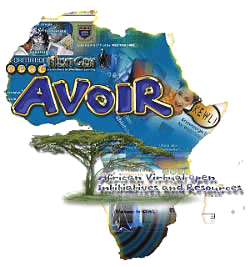


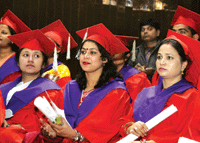 Peter Drucker made a statement in his article The Death of the University that: “Thirty years from now the big university campuses will be relics. Universities won't survive….” so that higher educational institutes shake off their inertia and utilise ICT to its best. The Indian institutes of higher education should also critically appraise what he meant to say as educational institutions in the western world and think of making the best use of ICT for their respective institutions.
Peter Drucker made a statement in his article The Death of the University that: “Thirty years from now the big university campuses will be relics. Universities won't survive….” so that higher educational institutes shake off their inertia and utilise ICT to its best. The Indian institutes of higher education should also critically appraise what he meant to say as educational institutions in the western world and think of making the best use of ICT for their respective institutions. Forays have been made in the field of e-Learning in form of Brihaspati, an e-Learning platform developed as open source freeware which IIT, Kanpur has developed and is using since January 2003 supported by Ministry of Communication and Information Technology, Govt. of India. Faculties are using this platform to post the lecture notes, handouts, and reference material on the Intranet for supporting the classroom teaching, benefiting over 75 Universities / Institutes across India, and the list is growing.
Forays have been made in the field of e-Learning in form of Brihaspati, an e-Learning platform developed as open source freeware which IIT, Kanpur has developed and is using since January 2003 supported by Ministry of Communication and Information Technology, Govt. of India. Faculties are using this platform to post the lecture notes, handouts, and reference material on the Intranet for supporting the classroom teaching, benefiting over 75 Universities / Institutes across India, and the list is growing. 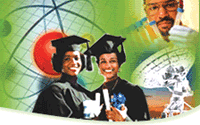 State wise list of Universities/Institutes approved by Distance Education Council India
State wise list of Universities/Institutes approved by Distance Education Council India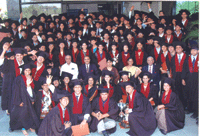
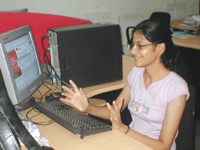 In the 2000-01 session, the School of Education Technology, Jadavpur University has started a new interdisciplinary 3-Semester (1
In the 2000-01 session, the School of Education Technology, Jadavpur University has started a new interdisciplinary 3-Semester (1 Oracle has launched a portfolio of over 80 industry-specific’ application solutions to address the needs of companies in 30 industry segments including industrial manufacturing, retail, life sciences, engineering, construction, professional services, financial services, government, education and health care.
Oracle has launched a portfolio of over 80 industry-specific’ application solutions to address the needs of companies in 30 industry segments including industrial manufacturing, retail, life sciences, engineering, construction, professional services, financial services, government, education and health care. MSC.Software Corp., a leading provider of enterprise simulation solutions to include simulation software and services, has detailed its Global University Programme, a multi-dimensional offering to complement introductions of MSC.Software’s SimEnterprise solutions.
MSC.Software Corp., a leading provider of enterprise simulation solutions to include simulation software and services, has detailed its Global University Programme, a multi-dimensional offering to complement introductions of MSC.Software’s SimEnterprise solutions.











